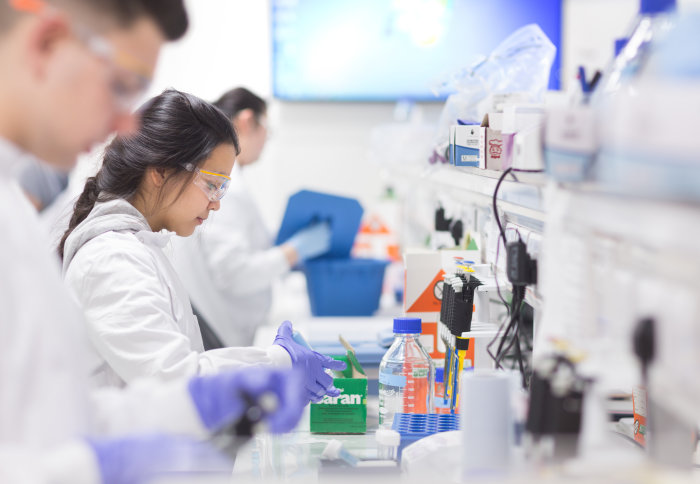‘Transformational’ teaching ideas get green light from Excellence Fund

Innovations in educational diversity and inclusive teaching have won backing from an Imperial fund.
In the second annual call out for bids to the Excellence Fund for Learning and Teaching Innovation, successful projects have been awarded funds to develop and encourage more inclusive learning and teaching at the College.
The Excellence Fund supports education initiatives that challenge College students to fulfil their potential. Those receiving funds help to form a community of excellent and innovative teachers who play a key role in promoting good practice and helping the College to deliver a world-class educational experience for all of our students.
Professor Simone Buitendijk, Vice-Provost for Education said: “The Excellence Fund continues to attract high quality, inspiring and innovative teaching proposals. It was designed to give our staff the time and space to be bold, to take risks, to investigate and to learn.
“As we continue to implement our Learning and Teaching Strategy over the coming months and years these kinds of transformational approaches will become central to an Imperial education.”
Each successful project will receive up to £50,000 a year.
Accessible teaching for students with specific learning differences
Project team: Professor Sara Rankin, Kate Ippolito, David Mooney
A new project will empower students to recognise the value of diversity and to use the most effective study strategies for their situation, while equipping teaching staff to develop inclusive and accessible curricula.
"The Excellence Fund continues to attract high quality, inspiring and innovative teaching proposals. It was designed to give our staff the time and space to be bold, to take risks, to investigate and to learn." Professor Simone Buitendijk Vice Provost for Education
A team led by Professor Rankin will focus on learning differences such as dyslexia and asperger’s, to help medical students overcome especially challenging points in their degree courses. Data indicates that students with specific learning differences (SpLDs) find the shift between years 3 and 4 of the College’s MBBS BSc courses most challenging, experiencing a dip in performance and needing to engage more with the Disability Advisory Service.
Professor Rankin said: “We have first-hand experience that students with SpLDs find the current design of the MBBS BSc year challenging. Indeed each year students come forward because of uncharacteristically poor academic performance and it transpires that they have a previously unidentified SpLD. Redesigning the BSc is a great opportunity. I am confident that this experienced team will generate a successful and impactful outcome.”
IMPACTS
Project team: Dr Wayne Mitchell, Dr Sophie Rutschmann, Katie Stripe, Dr Jeffrey Vernon
Inspired by the daily practice of the scientific community, IMPACTS (Inclusive Module for Professional and Critical Thinking Skills) is a programme developed to strengthen all Imperial students’ presentation and critical thinking skills.
It will be especially helpful for those students with specific educational needs who were born outside the UK, or those coming from non-research intensive undergraduate programmes.
Dr Sophie Rutschmann said: “Some skills are learnt through years of working as expert professionals. This is notably the case for reading and interpreting scientific papers, presenting research data in a clear and organised manner, proposing follow-on experiments or writing impactful papers/grants.
“These are all skills that we might ask our students to use and on which we might assess them, without really properly teaching them or without taking into account our students’ cultural, educational, language background, or specific learning differences.”
Professor Des Johnston, Vice Dean of Education for the Faculty of Medicine, said: “IMPACTS is exciting, it will address long-standing needs from our students and teaching staff, and will offer all of our students’ the key to unlocking the skills that will support them throughout their STEM career and their life.”
Developing Inclusive Teaching
Project team: Dr Mike Tennant
Students will get the chance to incorporate their individual voices, experiences and differences into learning materials and collaborative work thanks to a new initiative.
The project will deliver small-scale pilot lectures and a useful inclusive teaching handbook that can be shared with teaching fellows and academics across the College.
Originating from the Centre for Environmental Policy (CEP), this initiative reflects the College’s plans to integrate diversity into everything that it does. The CEP is making good progress, as its Environmental Technology MSc currently recruits students from 36 countries and has a 60/40 female/male gender mix.
Dr Tennant said: “The need to develop inclusive curricula is important not only so that all students can have equal and fair access to education, but also to reduce the widening inequality gap in the technology sector. The aim of this project is to develop and test inclusive teaching and learning of socially-relevant and STEM-related academic problems.”

Article text (excluding photos or graphics) © Imperial College London.
Photos and graphics subject to third party copyright used with permission or © Imperial College London.
Reporter
Murray MacKay
Communications Division